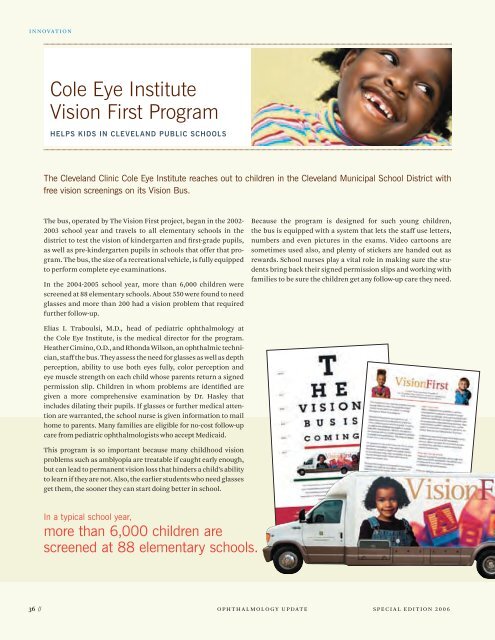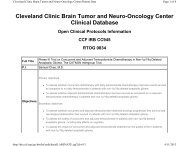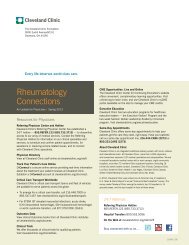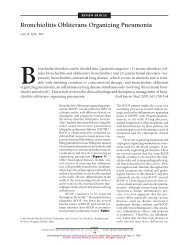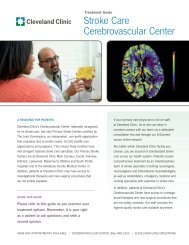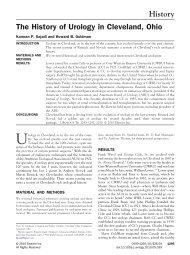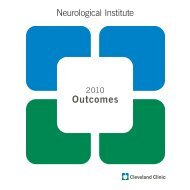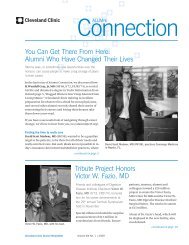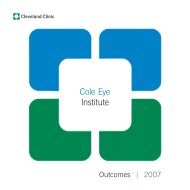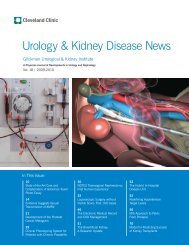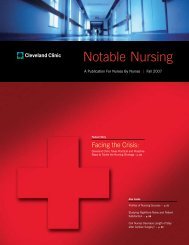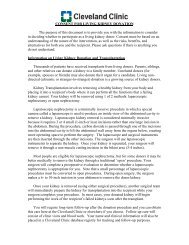Ophthalmology Update - Cleveland Clinic
Ophthalmology Update - Cleveland Clinic
Ophthalmology Update - Cleveland Clinic
You also want an ePaper? Increase the reach of your titles
YUMPU automatically turns print PDFs into web optimized ePapers that Google loves.
i n n O v a t i O n<br />
Cole Eye Institute<br />
Vision First Program<br />
HElps KIds In ClEvElAnd pUBlIC sCHOOls<br />
The <strong>Cleveland</strong> <strong>Clinic</strong> Cole Eye Institute reaches out to children in the <strong>Cleveland</strong> Municipal School District with<br />
free vision screenings on its Vision Bus.<br />
the bus, operated by the vision First project, began in the 2002-<br />
2003 school year and travels to all elementary schools in the<br />
district to test the vision of kindergarten and first-grade pupils,<br />
as well as pre-kindergarten pupils in schools that offer that program.<br />
the bus, the size of a recreational vehicle, is fully equipped<br />
to perform complete eye examinations.<br />
in the 2004-2005 school year, more than 6,000 children were<br />
screened at 88 elementary schools. about 550 were found to need<br />
glasses and more than 200 had a vision problem that required<br />
further follow-up.<br />
elias i. traboulsi, m.d., head of pediatric ophthalmology at<br />
the cole eye institute, is the medical director for the program.<br />
heather cimino, O.d., and rhonda Wilson, an ophthalmic technician,<br />
staff the bus. they assess the need for glasses as well as depth<br />
perception, ability to use both eyes fully, color perception and<br />
eye muscle strength on each child whose parents return a signed<br />
permission slip. children in whom problems are identified are<br />
given a more comprehensive examination by dr. hasley that<br />
includes dilating their pupils. if glasses or further medical attention<br />
are warranted, the school nurse is given information to mail<br />
home to parents. many families are eligible for no-cost follow-up<br />
care from pediatric ophthalmologists who accept medicaid.<br />
this program is so important because many childhood vision<br />
problems such as amblyopia are treatable if caught early enough,<br />
but can lead to permanent vision loss that hinders a child’s ability<br />
to learn if they are not. also, the earlier students who need glasses<br />
get them, the sooner they can start doing better in school.<br />
In a typical school year,<br />
more than 6,000 children are<br />
screened at 88 elementary schools.<br />
Because the program is designed for such young children,<br />
the bus is equipped with a system that lets the staff use letters,<br />
numbers and even pictures in the exams. video cartoons are<br />
sometimes used also, and plenty of stickers are handed out as<br />
rewards. school nurses play a vital role in making sure the students<br />
bring back their signed permission slips and working with<br />
families to be sure the children get any follow-up care they need.<br />
// O p h t h a l m O l O g y U p d a t e s p e c i a l e d i t i O n 2 0 0 6


